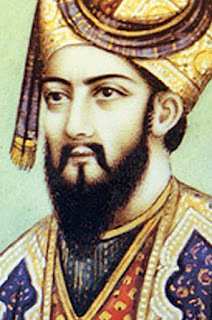Adolf Hitler | Biography , Rise to power & Facts | Britannica
Adolf Hitler | Biography , Rise to power & Facts | Britannica
 |
| Adolf Hitler | Biography |
Born: April 20, 1889
Braunau, Austria
Died: April 30, 1945
Berlin, Germany
German dictator and nationalist
Died: April 30, 1945
Berlin, Germany
German dictator and nationalist
The German dictator Hitler led the acute nationalist and racist National Socialist German Workers' Party and served as chancellor-president of Germany from 1933 to 1945. Arguably one among the foremost effective and powerful leaders of the 20 th century, his leadership led to the deaths of nearly six million Jews.
Early stage of life
Adolf Hitler was born on April 20, 1889, within the small Austrian town of Braunau on the Inn River along
the Bavarian-German border. The son of a particularly strong-willed Austrian customs official, his early
youth seems to possess been controlled by his father until his death in 1903.
Adolf soon became rebellious and began failing at school. He finally left school and formal education altogether in 1905 and commenced his long years of aimless existence, reading,
painting, wandering within the woods, and dreaming of becoming a famous artist. In
1907, when his mother died, he moved to Vienna in an attempt to enroll in the
famed Academy of Fine Arts. His failure to realize admission that year and therefore the next led him into a period of deep depression as he
drifted faraway from his friends.
It was duringthis point of feeling rootless that Hitler first became
fascinated by the immense potential of mass political manipulation (control).
He was particularly impressed by the successes of the anti-Semitic, or
anti-Jewish, nationalist Christian-Socialist party of Vienna Mayor Karl Lueger
(1844–1910). Lueger's party efficiently used propaganda (spreading a message
through literature and therefore the media) and mass organization. Hitler began to develop the acute anti-Semitism and racial mythology that were to stay central to his own "ideology" which of the National Socialist German Workers' Party .
In May 1913, Hitler returned to Munich, and after the outbreak ofwar I (1914–18) a year later, he volunteered for action within the German army in their war against other European powers
and America. During the war he fought on Germany's Western front with
distinction but gained no promotion (advancement) beyond the rank of corporal
(a low-ranking military officer). Injured twice, he won several awards for
bravery, among them the highly respected Iron Cross first-class .
It was during
In May 1913, Hitler returned to Munich, and after the outbreak of
Rise to power
With the outbreak of world depression within the 1930s, the fortunes of Hitler's movement rose rapidly.
In the elections of September 1930, the Nazis polled almost 6.5 million votes, and therefore the party had gained undeniable popularity in Germany. In
November 1932, President Hindenburg ,1847–1934, reluctantly called Hitler to
the chancellorship to go a coalition government with Nazis, conservative German
nationalists, and a number of other prominent.
The first two years in office were almost wholly dedicated to balancing power. With several important Nazis in key positions and Hitler's military ally Werner von Blombergwithin the Defense Ministry, he quickly gained practical control.
Hitler rapidly eliminated his political rivals and brought all levels of
government and major political institutions under his control. The death of
President Hindenburg in August 1934 cleared the way for Hitler to get rid of the title of president. By doing this, Hitler
officially became Führer (all-powerful ruler) of Germany and thereby head of
state, as well as commander in chief of the armed forces. Joseph Goebbels's
(1897–1945) extensive propaganda machine and Heinrich Himmler's (1900–1945)
police system perfected the complete control of Germany. Likewise, Hitler's
rule was demonstrated most impressively within the great Nazi mass rally of 1934 in Nuremberg, Germany,
where millions marched in unison and saluted Hitler's theatrical appeals
The first two years in office were almost wholly dedicated to balancing power. With several important Nazis in key positions and Hitler's military ally Werner von Blomberg
Preparation for war
Once control was assured, Hitler began mobilizing Germany's resources for
military conquest and racial domination of central and eastern Europe. He put
Germany's six million unemployed to work to prepare the nation for war.
Hitler's propaganda mercilessly attacked the Jews, whom Hitler related to all internal and external problems in Germany. Most
horrifying was Hitler's installment of the "final solution" of
imprisoning and eventually destroying all Jewish men, women, and children in
Himmler's concentration camps.
Foreign relations were similarly made for directed toward preparation of war. The improvement of Germany'sposition and therefore the acquisition of strong allies set the stage for war . To Germany he annexed, or
added, Austria and the German-speaking Sudetenland of Czechoslovakia, only to occupy all of Czechoslovakia early in 1939. Finally, through threats and promises of territory, Hitler wasready to gain the neutrality of the Soviet Union , the previous nation that was made from Russia and other smaller states. Alliances with Italy and
Japan followed
German defeat
Foreign relations were similarly made for directed toward preparation of war. The improvement of Germany's
added, Austria and the German-speaking Sudetenland of Czechoslovakia, only to occupy all of Czechoslovakia early in 1939. Finally, through threats and promises of territory, Hitler was
German defeat
With the German war effort collapsing, Hitler withdrew almost entirely from
In the last days of the Nazi rule, with the Russian troops


VerFÜHRERisch
ReplyDelete